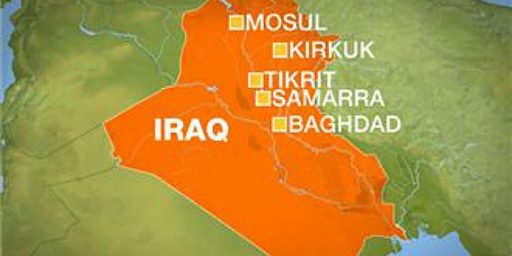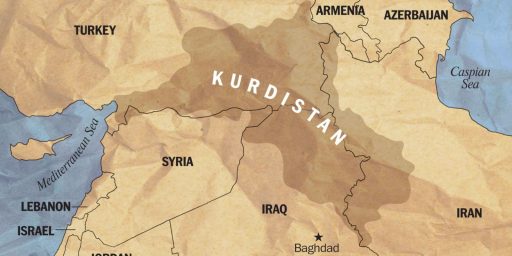Kurds Emerging as Deal Makers
Ballot Strength Leads Kurds to Press a Role as Deal Makers (NYT p. 1 rss)
Early election returns indicating that the Kurds could well be the power brokers in forming a new government have emboldened their leaders to press an ambitious agenda that could define the political battlegrounds in the new Iraq. If current election returns hold, the relatively secular Kurds may prove a necessary coalition partner, putting them be in a position to limit any attempts by religious Shiites to install an Islamic government. Kurdish leaders said Tuesday that they were pushing for a Kurd to be president of Iraq. They are also seeking guarantees that they can maintain an autonomous region in the north, which could in turn heighten tensions with neighboring countries that are suspicious of any moves toward Kurdish independence.
American officials have long considered the Kurds to be their closest allies in Iraq, partly because the Kurds, mostly Sunni Muslims, are generally less religiously observant than Arabs here. As the country moves toward a new government and constitution, the Americans will likely find themselves depending on the Kurds to act as a check on conservative Islamic politicians.
The Kurds’ confidence in their political muscle has grown tremendously since Monday, when it became apparent they are likely to have the second-largest bloc in the 275-seat constitutional assembly, and possibly the most cohesive and most courted. Because forming a new government will require a two-thirds vote, and because it seems unlikely the main Shiite slate will get such a majority, the Kurds may become an essential coalition partner.
[…]
Securing the post of president would give the Kurds enormous power in appointing key members of the new government, including the prime minister and cabinet. It would also bolster the standing of Kurds in the Middle East, where the governments of neighboring Turkey, Syria and Iran are fearful of any moves toward independence by Kurds in their own countries. Those governments will also watch closely what autonomous powers the Kurds demand. The Kurds have governed northern Iraq since the end of the first Persian Gulf war in 1991, when the Americans established a no-flight zone to protect the north from incursions by Saddam Hussein’s military.
The ambitions of the Kurds will likely be opposed by politicians seeking to install a Sunni Arab as president in order to draw the Sunni Arabs, who once ruled Iraq, into the political process, despite their widespread boycott of the elections.
There was talk of such a coalition emerging even before the elections were held. Still, this is excellent news, indeed. Given Iraq’s multi-cultural makeup, forming a government that includes the major groups and provides a high degree of regional autonomy is essential. This is especially true for this transitional government, which will have the task of drafting the permanent constitution and thus setting into place the rules by which future elections will be run. One hopes, too, that moderate Sunni elements are brought into the fold, presumably to include one of the vice presidencies.



